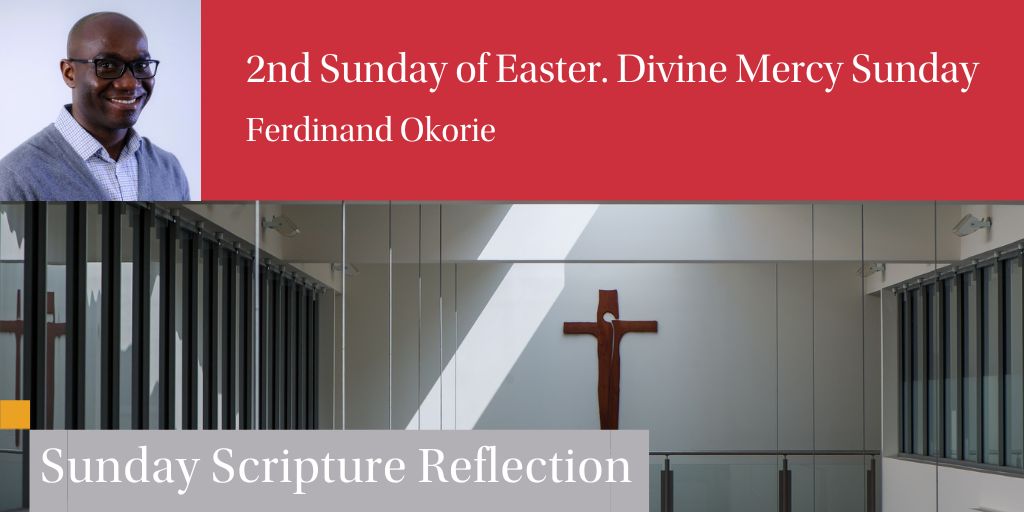
Readings:
Reading I: Acts 4:32-35
Psalm: 118:2-4, 13-15, 22-24
Reading II: 1 Jn 5:1-6
Gospel: Jn 20:19-31
The coat drive last November to benefit tens of thousands migrants in shelters across some major cities in the US in order to help them stay warm during the winter months, the hot meals prepared during the winter months by various organizations to feed migrants living in shelters, the pro bono legal clinics set up to help migrants apply for legal status and work permit, the health clinics set up to keep them healthy and to protect shelters from infectious diseases, and the efforts by families, organizations, and churches to provide housing for migrants across the major cities that welcomed many busloads of migrants. These collective efforts of individual, groups, charity organizations and cities to help migrants reminded me again of the invitation in our Roman Catholic tradition to practice the corporal works of mercy. The corporal works of mercy are in full display in the care and compassion migrants continue to receive in cities across the US. I’ve witnessed the compassion, the generosity and love that bind us to one another as children of God extended to the most vulnerable and despondent of men, women and children who crossed mostly the southern border of the United States in search of socio-economic freedom denied to them back home by an inept political leadership and social unrest.
The same outpouring of compassion and mercy shown to migrants in shelters across major cities in the United States were in full display in the life of the early church who was empowered by the Holy Spirit to be of one heart and mind bearing witness to our common humanity, and at the same time, they elevated the humanity of one another (Acts 4:32). Under the leadership of the apostles, the members of the early church lived in total appreciation of their humanity in relationship of solidarity with and support of one another. They were connected in shared essence of their personhood; and they elevated the humanity of vulnerable members of the community to a place of dignity and nobility by making the commitment to ensure that no member of the community suffered material needs (Acts 4:34). We learn from this community that material resources are to be used to benefit others (Acts 4:35). Whenever we make our resources available for the benefit of those who are in need, we truly display the nobility of our common humanity, we honor the invitation to look out for the good of one another (1 Cor 10:24), and we put into practice the corporal works of mercy of our faith tradition.
The early Christian community teaches us that the challenges of daily life some members of our community face invariably affect each and every one of us. The poverty of some members of the community reveals the inequality in the society and its dehumanizing effects in the lives of the children of God. It is impossible to look the other way in the face of human suffering, and hardship. The Christian community in today’s First Reading demonstrates to us that the reception of the Spirit of God demands that we ennoble the humanity of each other. The despondent faces of migrants across major cities in the US or the realities of refugees and communities displaced from their homes in war torn regions of the world have garnered mercy and compassion from individuals, agencies, cities and nations. Aids are collected and transported across the world to places of need in order to alleviate human suffering. Impelled by our common humanity, communities are bringing presence, care, compassion and human touch to the displaced and vulnerable population of our human family.
Just as the early church was enabled by the Holy Spirit to practice mercy and compassion towards others, likewise our outpouring of support to our brothers and sisters who are challenged by the circumstances of daily lives should not only be driven by our social concern for them. More so, our compassion towards them is because we have received the Holy Spirit (John 20:22) and we have been sent out by Jesus Christ (John 20:21) into the world to offer humanity the opportunity to experience the mercy and compassion of God through us. God sent Jesus into the world to gratuitously bestow on humanity the free gift of God’s mercy and compassion which humankind are unable to give themselves (see Rom 5:6-8). In Dives in Misericordia, St. Pope John Paul II speaks of the Easter glory as the ultimate proof of the mercy of God, a saving and redeeming divine mercy that restores humankind to the original state of intimacy with God. The restoration of humanity’s relationship with God makes divine mercy an experience in reconciliation for the human family (see Rom 5:10).
Similarly, Christ sends us to the world with the mandate to proclaim God’s gift of reconciliation and to forgive the wrongdoings that have damaged our relationship with God and with one another (John 20:23). Reconciliation restores our dignity and gives us the opportunity to experience mercy and compassion. Let us remember that the acts of mercy that we practice towards one another are our most profound expressions of equality and justice between us as the children of God.
Rev. Ferdinand Okorie, CMF
Vice President and Academic Dean
Assistant Professor of New Testament Studies
